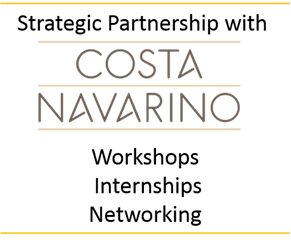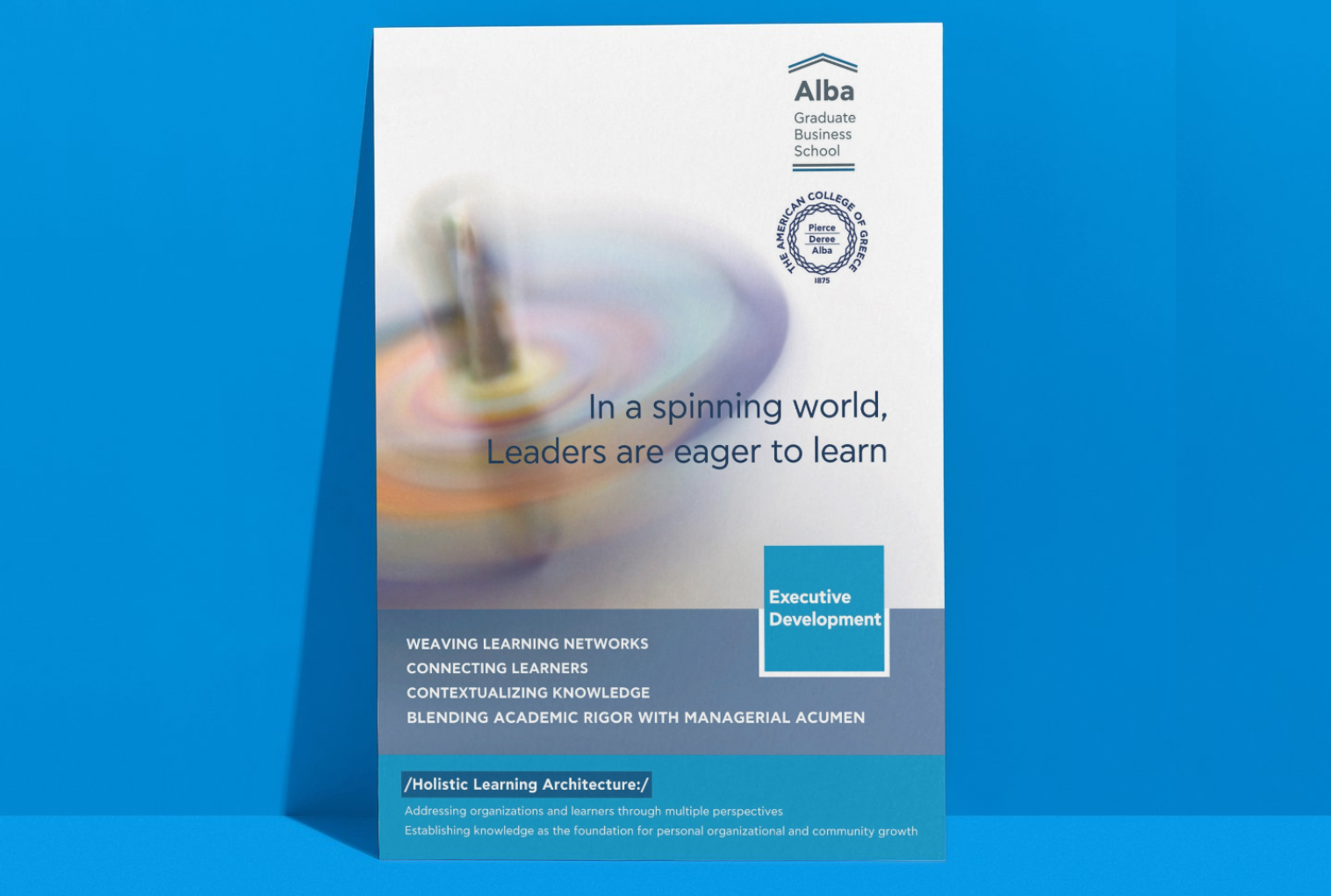MASTERS
MSc in Tourism Management
Upgrade to Business Class
DURATION
24 months / Evening classes via synchronous distance learning & face to face workshops
Application Deadline
Rolling Admission | Upcoming Deadline: December 1, 2025
START DATE
November 2026
FEES
€ 12,500
Overview
This program is designed to address the evolving needs of the tourism industry by developing highly skilled and knowledgeable professionals capable of taking on leadership roles in tourism management.
It combines specialized operational expertise with advanced managerial competencies to prepare the next generation of tourism executives. The curriculum places strong emphasis on cross-cultural, ethical, institutional, and environmental considerations in tourism management while equipping students with essential business and operational skills. The strategic partnership with Costa Navarino, along with collaborations with key industry players and a structured internship program, enhances professional networking opportunities and significantly boosts graduates' employability.

Why Tourism?
The tourism sector fuels growth and job creation around the world, at sustained pace, according to the World Tourism Organization:
- Represents approximately 9% of the global economy;
- Has created approximately 69 million new jobs in the past 10 years.
The Greek tourism industry is one of the most dynamic fields of employment in the country, according to SETE, the Association of Greek Tourism Enterprises:
- Represents 17.3% of the country’s GDP;
- Supports 18.3% of total domestic employment, directly employing nearly 700.000 people across all skill levels.
Key features of the program:
- Weekday synchronous, distance learning classes between 18:00 – 22:00, twice a week on average for part-time mode;
- 14 core modules and 5 workshops (3 of which face-to-face between November-March);
- Assessment: group reports/presentations, case study analysis, mid-term tests, final exams;
- Dissertation or Internship (in Greece or abroad).
The MSc in Tourism Management is designed for:
- Recent graduates seeking to build a career in the tourism, hospitality, and travel industries;
- Young professionals already working in tourism who want to advance into managerial or leadership roles;
- Career changers looking to transition into the tourism sector from other industries;
- Entrepreneurs interested in launching or managing tourism-related businesses;
- International students who want to gain expertise in tourism management while studying in Greece, a leading global tourism destination;
You may find here more information about the Program's Intended Learning Outcomes.
Current Student Profile
AGE
27
average in years
WORK EXPERIENCE
2
average in years
MALE
32%
FEMALE
68%
Highlights
International Recognition: Accredited by the New England Commission of Higher Education (NECHE), ensuring global academic credibility.
Innovative Learning Experience: A distinguished faculty of resident and visiting professors, combined with cutting-edge technology and flexible learning formats, enables tourism professionals in Greece and beyond to engage in high-quality synchronous distance learning.
Academic Excellence with Practical Application: The program blends rigorous academic coursework with hands-on workshops (some with the option of being conducted in-person, from November to March) led by industry experts. These sessions address real-world challenges in travel, destination management, tour guiding, event planning, conferences, leisure, and entertainment management.
Strategic Partnership with Costa Navarino: Specialized workshops conducted by Costa Navarino professionals provide insights into hospitality and destination management. Students also participate in a three-day visit to The Westin Resort Costa Navarino, a premier sustainable destination in Messinia, featuring luxury accommodations, golf courses, spa facilities, and authentic cultural experiences.
Global Internship Opportunities: Students gain valuable industry experience through a three-month internship at top tourism organizations.
Industry Connections: Students benefit from Alba’s strong ties with the Greek tourism sector, providing networking opportunities and industry insights that enhance career prospects.
Member of

Winner of

Curriculum
MSc in Tourism Program PT Total Year Schedule 2025 - 2027
Important Notes:
- Mandatory Study Visit: As part of the Introduction to Tourism Management course, students are required to participate in a three-day visit to Costa Navarino Resort. The estimated cost for this visit is approximately 350 euros;
- Career Development: This opportunity is available exclusively to Greek and EU students. International students holding a VISA who are unable to complete an internship in Greece due to immigration regulations may opt for a paid internship in the United States through HRC-International (additional fees apply). Alternatively, they can explore global internship opportunities via the international job portals provided by Alba’s Career Office;
You may find the Graduate Academic Calendar 2025–26 here.
1st Period | November - December
Courses
This course explores the nature, structure, and scope of the tourism and hospitality industry, examining how broader business environment factors and emerging trends impact the management of key sectors such as accommodation, transportation, tour operations, and visitor attractions. By analysing the unique characteristics of tourism as a product and the distinct dynamics of tourism demand and supply, the course highlights essential considerations, challenges, and best practices in contemporary tourism and hospitality management. A three-day visit to Costa Navarino enhances the learning experience, providing students with hands-on insights into various aspects of hospitality management.
This course explores key aspects of managing people in tourism organizations, including motivation, engagement, teamwork, leadership, emotional intelligence, cultural awareness, and change management. Each session blends classical and modern concepts, drawing on foundational theories and real-world case studies from the tourism sector to provide practical insights and applications.
This course equips students with a strong foundation in marketing management within the tourism industry. It fosters an analytical perspective and a critical understanding of key marketing concepts, models, and tools as they apply to tourism organizations. Through case studies and real-world examples, students will explore the practical relevance of marketing theories for tourism managers. They will also be encouraged to apply these theoretical frameworks to real-life marketing scenarios within the tourism sector.
The purpose of the workshop is to address the question ‘what is the skill of writing?’. According to the American writer Edwin Schlossberg, “the skill of writing is to create a context in which other people can think”. The workshop explores this statement. This exploration and subsequent understanding is of paramount importance for any business activity, since much of the communication in the business world takes place in writing, usually within tight deadlines, ranging from short, simple e-mails to long, rich documents. The salient gain of the participants from the workshop is the understanding of different modes and purposes of writing, as well as of different types and purposes of documents. The main topics covered during the workshop include: the requirements of different types of documents, such as reports, case studies, research papers and proposals, proper referencing, and the research process.
2nd Period | January – February
Courses
This course explores the distinctive elements of designing and managing service operations, with a specific focus on the tourism and hospitality industry. It introduces students to key challenges and critical issues that successful service organizations encounter today. By completing this course, students will gain the necessary tools and frameworks to identify and implement effective management processes that enhance efficiency, quality, and overall service excellence.
This course equips students with the knowledge and skills needed to understand and utilize financial and accounting information for effective decision-making. Key topics include the role and branches of accounting, users of financial information, the accounting cycle, and financial statements. Students will also explore techniques for analysing and interpreting financial statements, the fundamentals of management accounting, cost concepts, cost-volume-profit analysis, cost allocation, and investment appraisal methods such as Net Present Value (NPV) and Internal Rate of Return (IRR). Emphasis is placed on the application of these concepts within the hotel and tourism industry through real-world examples and case studies.
This course examines the theoretical and practical aspects of crisis management in the tourism sector. Students will explore crisis identification, prevention, response strategies, and recovery processes, with a focus on the specific challenges tourism businesses face during natural disasters, health crises, political instability, and other unforeseen events. Additionally, the course highlights the strategic importance of corporate reputation and introduces fundamental methods of risk and reputation management.
3rd Period | March – April
Courses
This course bridges academia and the business world, offering students a unique opportunity to advance their careers and professional development in the tourism industry. As a credited and graded course, it provides valuable experiential learning. Key benefits for students include: The integration of academic knowledge with hands-on industry experience. The development of relevant skills and a deeper understanding of tourism operations. The opportunity to refine career goals and enhance employability. Career development can take the form of either an internship for students not currently working in the industry or professional development for those already employed in tourism.
4th Period | November - December
Courses
This course provides an introduction to the theory, principles, and practices of revenue management (RM), with a specific focus on its application in the growing tourism industry. It explores key revenue management strategies, their implementation, and evaluation, equipping students with the knowledge and skills necessary to optimize revenue in tourism-related businesses. Designed for those with a particular interest in the tourism sector, the course offers practical insights into maximizing profitability and operational efficiency.
The hospitality and tourism industry is among those most impacted by digital advancements, with the travel sector being an early adopter of digital marketing. As technology continues to influence traveller behaviour, businesses must continuously adapt and refine their strategies. This course provides a comprehensive overview of the digital marketing landscape, exploring key channels and their applications. It delves into three specific areas - (1) Website and landing page architecture, (2) Social media strategy, and (3) Social media campaigns - offering students in-depth insights through case studies and real-world scenarios. Each channel is complemented by a hands-on workshop where students apply concepts and models discussed in class to create practical deliverables. The course aims to equip students with a dynamic mindset for managing digital marketing projects, preparing them to navigate the ever-evolving digital landscape effectively.
Building upon the foundational concepts introduced in the Introduction to Tourism Management course, this course takes a deeper look at the economic, socio-cultural, and environmental impacts—both positive and negative—of the tourism industry. It highlights the interconnected nature of these impacts, emphasizing the need for strategic approaches to maximize benefits while minimizing costs. Students will explore key sustainability principles, potential challenges, and essential management tools and methods. The course also fosters critical reflection on the role and responsibility of various stakeholders in implementing sustainable practices within the tourism and hospitality industry. These concepts are brought to life through an in-depth case study of the Ninki Nanka Trail in The Gambia.
5th Period | January - February
Courses
This course focuses on enhancing business problem-solving through the application of technological tools and data analytics. It explores the importance of the customer journey and the role of technology in creating unique, personalized customer experiences. Students will engage with real-world case studies and participate in hands-on workshops led by industry experts from the hospitality and IT sectors. The course culminates in team-based presentations, where students develop and present a strategic plan based on a given scenario, applying the insights and skills acquired throughout the course.
This course explores key aspects of supply chain management, including supply chain coordination, supplier selection, purchasing methodologies, contracting, material forecasting, and safety stock management. It also examines service design strategies that enhance supply chain efficiency. Emphasis is placed on best practices that drive effective, customer-responsive supply chain processes—ensuring high-quality service delivery at competitive costs while maintaining strong financial performance within environmental, ethical, and legal frameworks.
6th Period | March– April
Courses
This course bridges academia and the business world, offering students a unique opportunity to advance their careers and professional development in the tourism industry. As a credited and graded course, it provides valuable experiential learning. Key benefits for students include: The integration of academic knowledge with hands-on industry experience. The development of relevant skills and a deeper understanding of tourism operations. The opportunity to refine career goals and enhance employability. Career development can take the form of either an internship for students not currently working in the industry or professional development for those already employed in tourism.
The Dissertation is an independent research project that allows students to explore a topic of personal interest within a faculty member’s area of expertise. Throughout the process, students will develop essential research skills, including designing a detailed research plan, conducting a comprehensive literature review, identifying key research questions, and transforming them into empirical inquiries. They will learn to justify and apply appropriate research methodologies, analyze financial or social data, and synthesize their findings into a well-structured report. The final dissertation will include a literature review, research questions, methodology justification, data analysis, and a discussion of findings in relation to existing research and methodological considerations.
7th Period | November – December
Courses
This course serves as an integrative framework for the entire program, introducing fundamental principles of business strategy and the decision-making processes within tourism organizations at both the destination and organizational levels. Students will explore key strategic elements, including market selection, product positioning, competitive strategies, external environment interactions, and adaptation to change. Additionally, the course examines how tourism organizations develop structures and policies to achieve their goals. The critical role of HR professionals in corporate strategy formulation and implementation will also be highlighted.
The Entrepreneurship in Tourism course guides students through the process of creative thinking, idea generation, and problem-solving, with the ultimate goal of developing a business plan for a new venture. The course begins by enhancing students' creativity and opportunity recognition skills, equipping them to identify and assess dynamic business prospects. Additionally, students will participate in an Event Management workshop, covering key concepts such as event characteristics, classifications, pitching strategies, and essential management tools. Through case studies of various event types, they will gain practical insights. Finally, students will have the opportunity to design and pitch their own event, applying their entrepreneurial ideas in a real-world context.
The Professors
The program is taught by distinguished resident faculty and visiting experts with deep expertise in operations, hospitality, digital marketing and sustainable destination management, blending academic rigor with industry-relevant insights.
Academic Director

Evangelia Baralou
Course Faculty

Evangelia Baralou

Georgios Batsakis

Christos Koritos

Paul Lacourbe

Georgios Papageorgiou

Vasilis Theoharakis
Career
Graduates of the program will be able to:
- Identify new trends and the requirements of employers, and adapt and respond effectively;
- Provide outstanding service along international standards and manage successfully the complexities of the tourism industry;
- Command the theory and practice in all aspects of running a tourism business: strategy, finance, marketing, operations, human resources;
- Contribute to the management and organization of: hospitality, travel, destination, event, conference, leisure, entertainment and real estate development;
- Handle the internal IT systems and online media channels necessary for digital marketing and operations.
Scholarships Scheme
You can secure pre-approval of your Scholarship, before you apply for admission to the MBA or MSc program of your choice.
Admission Requirements
To be considered for admission, candidates must:
- Hold a bachelor degree;
- Provide evidence of excellent command of the English language;
- Need to be currently employed or self-employed;
- GMAT (Focus Edition) test is optional unless the Academic Committee requires the applicant to take it: in any case, scores of 515 or more (GRE >155) can strengthen your application and help you secure a merit scholarship.
Candidates must submit:
- The completed application form, including one recent photograph in jpeg format;
- Two letters of recommendation, in Greek or in English language;
- Official academic transcripts as well as certified copies of degrees from each undergraduate, graduate or professional degree earned;
- Proof of competence in the English language (unless schooled in English): Proficiency (Cambridge Proficiency, Michigan Proficiency, MSU Proficiency), or TOEFL, or IELTS, or Duolingo English Test;
- Three essays, as indicated in the Application form;
- Receipt of the non-refundable application fee's [€60] deposit.
Click here to download the details for admission.
For details on academic policy, course credit policy, fee policy, and rules for student conduct, please refer to the Student Handbook .
Additionally, the School's Students Code of Conduct can be found here.
Important information for International Students: Student Visa seeking international students must complete their application process by June each year- the latest. Program starts in November each year. Please also note, since the program is online, student VISA is optional and international students can travel to Greece in order to participate in face to face workshops with a tourist VISA. Students will require to apply for tourist VISA twice during the Academic year.
Request a brochure
Get in touch with us
We urge applicants to request further information or to come for a meeting at our downtown campus, in order to better understand their profile and motivations.
Just fill out and submit the form below and we will respond to you as quickly as possible.










.JPG)
